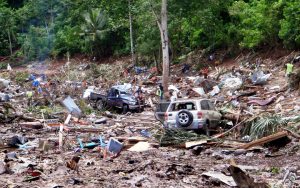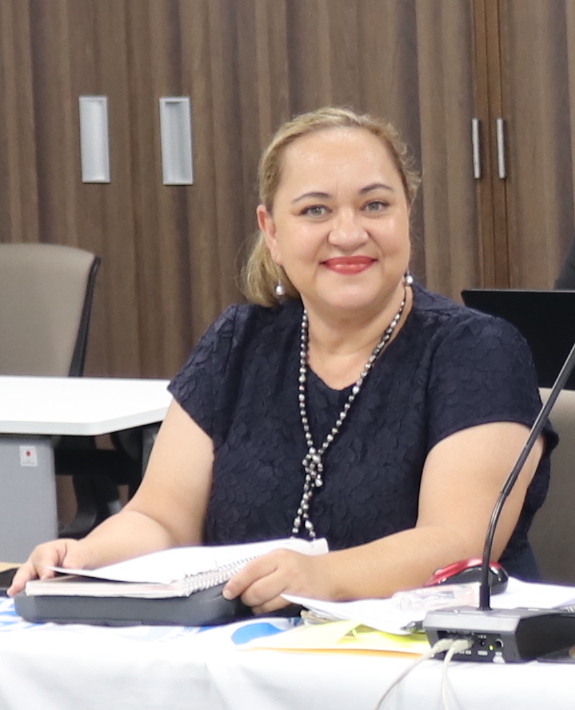The Pacific region’s call for strengthened finance to minimise Loss and Damage (L&D) associated with the adverse impacts of climate change has been amplified in Bonn, Germany, with the emphasis placed on the need for new and innovative sources of finance to begin to address this “lived reality for our region.”
The concept of Loss and damage in climate negotiations refers to the consequences of climate change that go beyond what people can adapt to, or when options exist but a community doesn’t have the resources to access them.
Taking the floor during the Glasgow Dialogue to discuss funding arrangements for averting, minimising and addressing loss and damage, SPREP’s Director Climate Change Resilience,Tagaloa Cooper-Halo, reaffirmed that Loss and Damage is of the utmost priority for Pacific Small Islands Developing States (PSIDS), already experiencing considerable losses that are worsening with every year that passes.
“It is important to acknowledge that we have failed to “avert” loss and damage,” Cooper-Halo told the global gathering, pointing out that the greatest gap in loss and damage-related finance is in “addressing” the problem.
“In this case the cupboard is bare – there is no meaningful finance at the scale required,” she said. “Slow on-set events such as bleaching and loss of coral reefs, with consequences for food security, economies, health and culture are not supported in a sustained way and the level required. Projections tell us that a significant proportion of our commercial tuna fisheries will move from our EEZs into the high seas where their value to our communities is lost.”
But that’s not all. Cooper-Halo reminded that sea level rise and storm surges are destroying Pacific island cultural sites and washing burial grounds away.
“These are not simply “non-economic” losses, they are fundamental losses to our heritage and identity. Loss of land to the sea also means changes to historical land tenure traditions leading to tensions and issues of equity which we have never dealt with before and to which there is no easy answer,” she said. “Even where we have begun to minimise L&D, the frequency of damaging climate change events leaves no time to build back better. These compound and overlapping risks and the continual erosion of our resilience are not fully acknowledged within climate finance regimes.”
The UNFCCC COP26 established the Glasgow Dialogue between parties, relevant organisations and stakeholders to discuss the arrangements for the funding of activities to avert, minimise and address loss and damage. The Secretariat of the Pacific Regional Environment Programme (SPREP) is amplifying the Pacific’s voice during the dialogue attended by a broad range of stakeholders, giving visibility to the frontline communities and those most vulnerable to the adverse effects of climate change.
The Pacific islands are in the throes of a climate crisis. Despite contributing to less than 1% of the world’s total greenhouse gases, Pacific island people are on the frontline, and amongst the most vulnerable, to the impacts of extreme weather events. Our seas are rising, oceans are warming, and extreme events such as cyclones, flooding, droughts and king tides are frequently more intense.
To combat this, the Pacific continues to call for an urgent increase in mitigation ambition. On the floor of Glasgow Dialogue in Bonn, SPREP’s Director of Climate Change Resilience said that even with recent pledges to reduce emissions, the Pacific islands are locked into a world of extensive, and potentially existential, loss and damage.
“As a result, “minimising” loss and damage is crucial for our nations and peoples. We are working to achieve this through a combination of disaster risk reduction (DRR) and adaptation efforts financed by a wide range of multilateral donors (GCF, AF etc) international agencies and bilateral donors,” she said.
“Some good examples include the World Meteorological Organisation’s (WMO) Early Warning System Pacific Small Islands Developing States (CREWS Pacific SIDS Project) which is helping to develop community-based early warning systems. And the Green Climate Fund Van-KIRAP Project in Vanuatu which is delivering climate science to support decision makers and communities in Vanuatu to prepare for and adapt to climate variability and change.”

Cooper-Halo admits that it is difficult to keep pace with the climate hazards that continue to unfold.
“The financial challenges we face in “minimising” loss and damage include the project-based nature of support, which makes it hard to sustain benefits when we are suffering ever more challenging climate impacts; the speed of climate finance; and the capacity to deliver multiple projects with differing donor demands.”.
SOURCE: SPREP/PACNEWS














